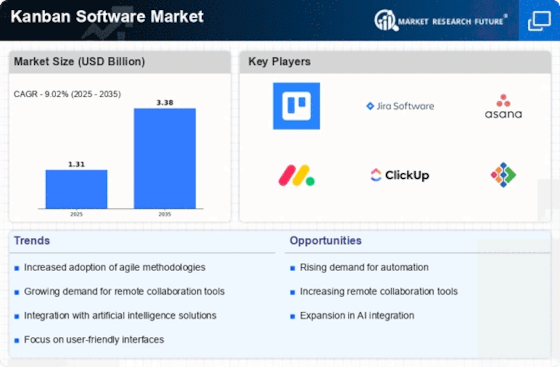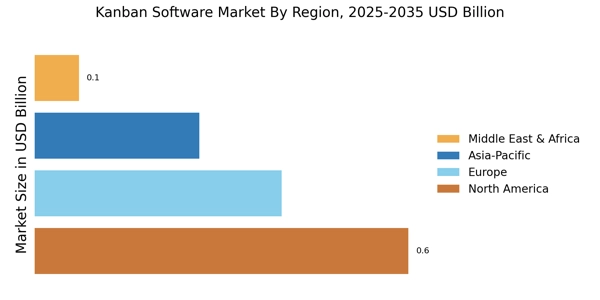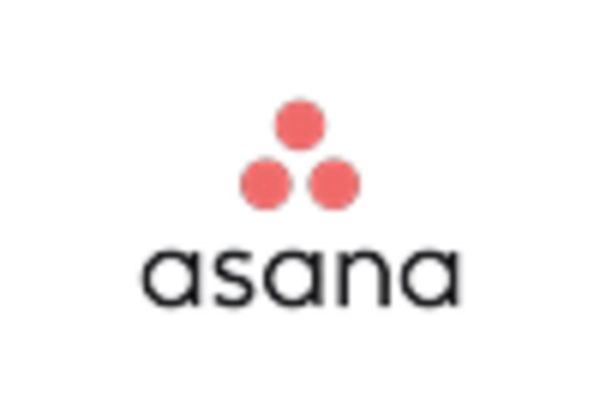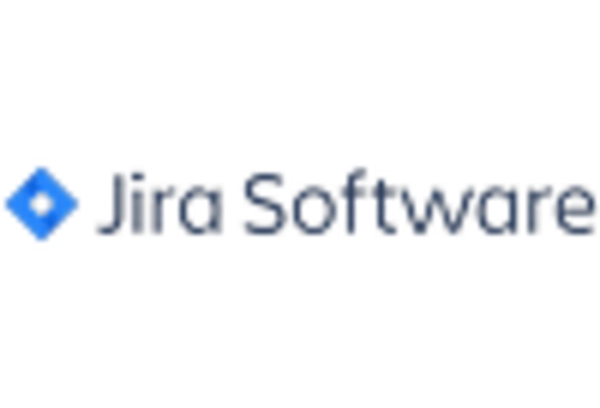Integration with Emerging Technologies
The Kanban Software Market is poised for growth due to the integration of emerging technologies such as artificial intelligence and machine learning. These technologies enhance the capabilities of Kanban software by providing predictive analytics and automation features. Data indicates that organizations leveraging AI-driven project management tools can improve project delivery times by up to 30%. As businesses seek to harness the power of technology to optimize their workflows, the demand for Kanban solutions that incorporate these advancements is expected to rise. This integration not only streamlines processes but also positions the Kanban Software Market at the forefront of technological innovation.
Shift Towards Remote Work Environments
The Kanban Software Market is witnessing a shift towards remote work environments, which has catalyzed the adoption of digital project management solutions. As organizations adapt to flexible work arrangements, the need for tools that support remote collaboration becomes paramount. Data suggests that 70% of teams working remotely utilize project management software to maintain productivity and communication. Kanban software, with its emphasis on visual task management, is particularly well-suited for remote teams, enabling them to track progress and manage workloads effectively. This trend indicates a sustained growth trajectory for the Kanban Software Market, as more companies seek solutions that cater to the demands of a distributed workforce.
Increased Focus on Continuous Improvement
The Kanban Software Market is significantly influenced by the growing emphasis on continuous improvement methodologies. Organizations are increasingly adopting practices that promote iterative enhancements in their processes. This focus is reflected in the data, which shows that companies implementing continuous improvement strategies experience a 15% reduction in operational costs. Kanban software facilitates this by allowing teams to visualize their workflows and identify areas for enhancement. As businesses strive for efficiency and effectiveness, the demand for Kanban solutions that support continuous improvement is likely to escalate. This driver underscores the importance of adaptability and responsiveness in the Kanban Software Market.
Rising Demand for Visual Project Management
The Kanban Software Market is experiencing a notable increase in demand for visual project management tools. Organizations are increasingly recognizing the benefits of visualizing workflows, which enhances transparency and accountability. This trend is supported by data indicating that companies utilizing visual management techniques report a 20% increase in productivity. As teams seek to streamline processes and improve collaboration, the adoption of Kanban software is likely to rise. The ability to visualize tasks and their progress allows teams to identify bottlenecks and optimize resource allocation effectively. Consequently, this driver is pivotal in shaping the Kanban Software Market, as more businesses prioritize tools that facilitate visual management.
Growing Need for Cross-Functional Collaboration
The Kanban Software Market is increasingly driven by the need for cross-functional collaboration within organizations. As teams become more interconnected, the demand for tools that facilitate collaboration across departments is rising. Data suggests that organizations with effective cross-functional collaboration experience a 25% increase in project success rates. Kanban software, with its visual task management features, enables teams to work together seamlessly, regardless of their functional areas. This trend highlights the importance of collaborative tools in the Kanban Software Market, as businesses strive to break down silos and foster a culture of teamwork.

















